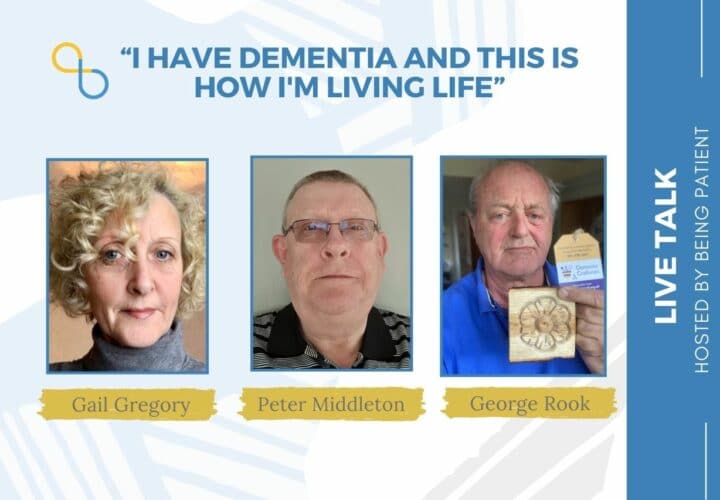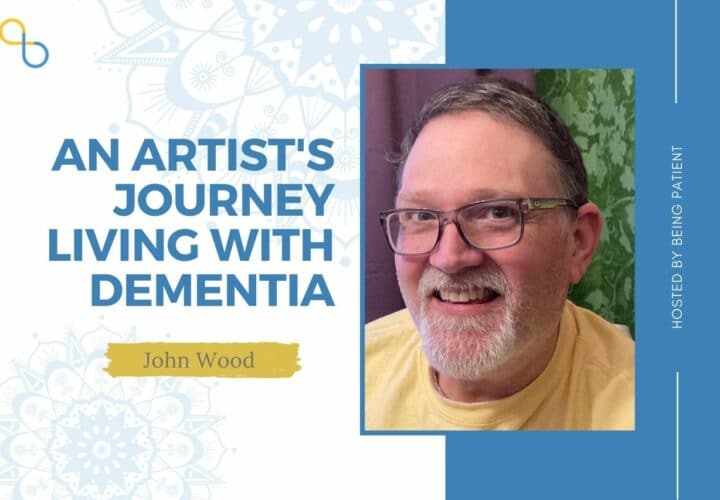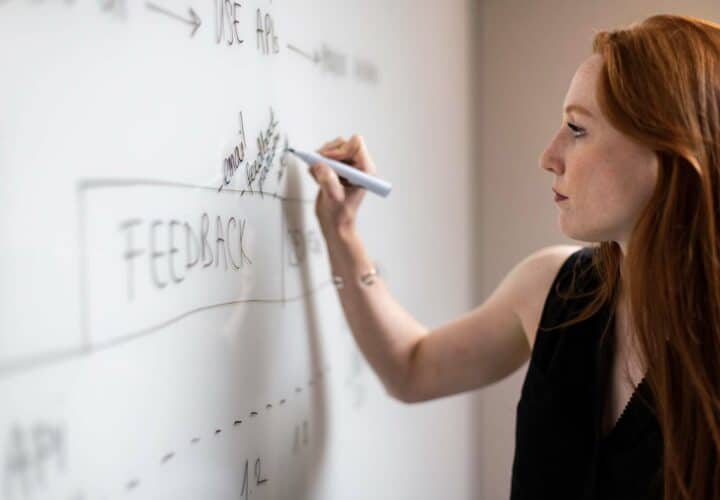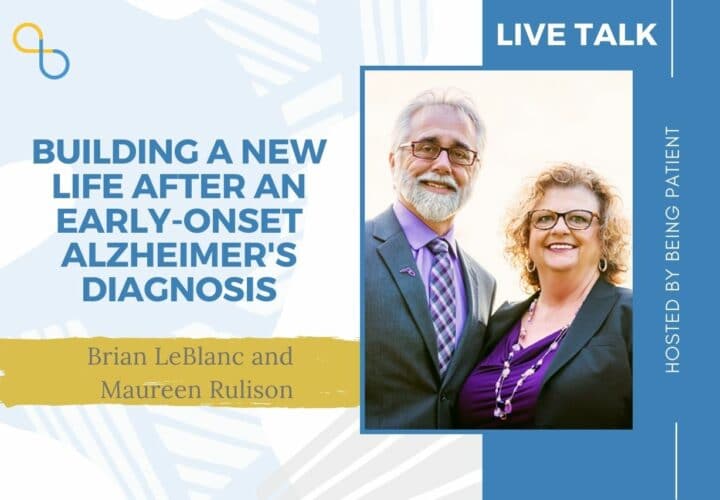Gail Gregory, Peter Middleton and George Rook open up about their dementia diagnoses and what it means to live well with the illness.
A dementia diagnosis represents a new chapter in life: As people contend with the challenges that accompany the illness, they could also find new connections, friendships and hobbies. Some may carry on with their careers and passions from before their diagnoses, finding fresh avenues to expand their work — contrary to the common misconception that people with dementia are, by default, in the late stages of the illness when they may be living in long-term care with significant cognitive, behavioral and physical impairments.
Being Patient spoke with Gail Gregory, Peter Middleton and George Rook about their journeys with dementia and how they have found ways to stay active, creative and engaged following a diagnosis.
Being Patient: Peter, the clinician initially thought you had mental health issues instead of dementia, and it wasn’t until later that you were diagnosed with early-onset Alzheimer’s. Can you share with us your experience with the doctors?
Peter Middleton: The diagnosis process for me lasted nearly two years. I think I’m certainly not unique in that because what happens here in the UK with our wonderful National Health Service, you get a 10-minute doctor’s slot. It’s very easy to diagnose somebody with anxiety and depression right out of sick note and fill them with antidepressants. That’s what happened to me. Doctors are the boss.
But I knew that I wasn’t depressed. I knew I didn’t have anxiety; I had some because I knew there was something wrong with me, and so it went on. But eventually, I was lucky that my employer — Northamptonshire Police at that time — had a good occupational health doctor.
As soon as I went to see the occupational health doctor, she looked at me and immediately said, “I believe you may have dementia.” It was her who managed to get me an appointment with a neurologist, and an MRI scan. MRI scans are very expensive and getting one is not an easy thing. As soon as that happened, I was diagnosed and all of a sudden, a great weight was lifted off my shoulders because I actually knew what the problem was.
“If you’re drowning in loneliness, hold your hand up.
Someone will notice you and come rescue you.
But until you hold your hand up, no one’s gonna see it.
That’s the problem out there:
We’ve got lots of drowning people.”
Being Patient: Gail, what was the process of diagnosis like for you?
Gail Gregory: I had been suffering from depression a couple of years before I was actually diagnosed. I told the doctor then that it wasn’t depression [that led to my cognitive symptoms]. I knew there was something else going on. They sent me to a counselor and every time I went to the counselor, I said, “Sometimes I feel like I’m going mad. This is not depression. This is something totally different.” She told me to keep going back to the doctors, who just handed out the antidepressants, and I wouldn’t take them.
Then we moved and I got a wonderful doctor who — on the day that I went and told him that I thought I was having memory problems, confusion — immediately carried out a very simple test: What day it is, what time it is, [whether you could] draw a clock, just the simple things … And they said, “We’re going to refer you to the memory clinic.” I think it took me about 12 months to get the diagnosis of early-onset Alzheimer’s through blood tests and MRI scans and the various tests that they put you through.
Being Patient: George, you were ultimately diagnosed with Alzheimer’s and vascular dementia. Can you share with us your experience with medical providers?
George Rook: I was diagnosed with mild cognitive impairment about five years before I actually got a diagnosis of dementia. I went to my local general doctor and I said, “Look, I think I need to be referred.” He said, “Well, what’s the point? If it’s vascular dementia, there’s no treatment for it. Nothing would change. I’m not going to refer you. Go away.” [And we thought it was vascular dementia.]
He said the same thing a year later, and it was only the following year when I went with my dear wife, we both just sat there and said, “You are going to refer me.”
I’ll tell you something really interesting that people should know. The three of us have still got pretty much the power of speech. Everybody loses different bits of their brains at different times. But the three of us — I certainly know I have and I suspect the other two will have had also — had people say to you, “You haven’t got dementia. How can you possibly have dementia? You can still speak.”
That leads on to the biggest misconception about dementia and the fact that when you’re given a diagnosis, I was told by the people who provided the diagnosis, quite literally, “Don’t take any risks. Don’t get tired. Stop doing as much.” That was exactly the wrong thing to be told. It was all about being disabled, rather than enabled.
Being Patient: What’s a better approach?
George Rook: It’s a bit like when you meet someone whose partner has just died, “What the hell do you say?” Well, the thing to do is to listen. The dementia is not what’s important. What’s important is me and what goes on in terms of my feelings, desires, wishes and fears.
[I know reasonably well] a GP (general practitioner) — not as well as I might now because she said on two occasions when visiting as a friend, “You sure they’ve got the diagnosis right?” She’s assuming, as a lot of people do, that if you have dementia, you are unable to do anything. You are sitting in a chair staring at a wall, probably slumbering and being fed through with a spoon, if you’re lucky. But, dementia starts somewhere and we are just somewhere on that road.
“As we go on, we will need more support to do things
that matter to us — that’s the key. I often say,
‘What matters is what makes you smile or want to get
up in the morning because once that’s
gone, life ain’t worth living.'”
Being Patient: How could medical providers do a better job in caring for people with dementia?
George Rook: In Britain, there is, in reality, very little support provided for you after you’ve had a diagnosis. There’s been a great push to increase the rate of diagnosis, quite rightly, but we haven’t had the other side of that particular coin which is providing support to people.
The three of us here don’t need much very often. We might need some help because we might not know about some benefits we might be entitled to, tax reductions, that sort of stuff.
But as we go on, we will need more support to do things that matter to us — that’s the key. I often say, “What matters is what makes you smile or want to get up in the morning because once that’s gone, life ain’t worth living.” We will, at some stage, need support to continue doing that. But there is very little support out there until you’re in danger of being admitted to hospital.
What we need is a proper, joined up system for providing the simple things initially, and for someone to be able to keep in touch and help you with whatever you might need. In particular, what we need are peer support groups. The three of us have managed to access them, but they’re very few and far between. Out of 850,900 people in the UK with dementia, probably no more than a couple of thousand go to any peer support groups, and possibly less. That is appalling, because they’re missing out so much and people stay hidden away, feeling miserable, and they lose their self-identity.
Being Patient: Have the three of you been able to find activities that have helped you stay engaged?
George Rook: After diagnosis, it took a while because like most people, I was given a stack of leaflets about dementia, but I was not given anything about what I could do locally to either make friends or share my experiences to peers, that sort of stuff.
It took about a year and a half before by chance, probably through Twitter actually, I found out about this DEEP (Dementia Engagement and Empowerment Project) group and got myself invited to one of the Welsh conferences. From then on, everything opened up. When we meet other people with the disease, and can just talk, and be stupid occasionally, and quite often rude, we are with people who understand and people who don’t question. Conversations go all over the place because none of us can keep on track, but it’s good fun.
We learn to do things. In the last 18 months, I’ve started learning to carve, wood, and to paint with watercolor.
Gail Gregory: When lockdown started, I found the DEEP groups and could see people struggling and wanted to give them something to do. It’s all about giving people a purpose and it’s all about encouraging people and building confidence. I’m a great believer in crafting and finding something that you’re interested in and something that you can do, whether it be photography, art, card making, anything. I started off by making fairy houses and I did a little video on Youtube. People were asking me how to do this. People were engaging and all coming together.
A wonderful project all came together with Innovations in Dementia and that was the Craftivism project. Everybody was doing their craft. George was doing his wood carving and other people were doing the watercolors and clay. Everybody had a purpose where we were all coming together and having fun. It didn’t matter if we were making mistakes. We were just all together, having fun, and that’s what matters.
Peter Middleton: The term hidden disability is something that the public in general just can’t come to terms with. If the three of us were sitting here with prosthetic limbs, you just have a quick look and carry on and not remark upon it. But because when we’ve got something that you can’t see, you’re intrigued. That’s why people ask you questions and why they can’t believe that you’re not the person you used to be.
My short-term memory is not so good, but I come with a lifetime of skill and experience, things that I’ve been doing for donkey’s years and I still got those skills and experience. I can still carve wood. I can still tinker with an engine. I can still drive.
You wouldn’t ask Uncle Albert with a wooden leg if he can still play football. If I tell someone that I keep losing my mobile phone, they say, “Well, I’m always losing my mobile phone as well,” as if they’re trying to say that there’s probably nothing wrong with you. They’re in denial and it’s a very strange thing to have to put up with.
I do a lot of work with cameras and making animations, short films. I run a blog, anything that involves computing. I write mobile phone apps, all sorts of stuff really just to keep myself mentally nimble.
Being Patient: What would your advice be for people with dementia to stay engaged?
Gail Gregory: Find a group. Peer support groups are absolutely wonderful. You can talk to people. You can relax with people that are in the same situation that you are. Every dementia diagnosis is different. Once you’ve met one person with dementia, that is the one person that you’ve met. Somebody else will be totally different. You’re in a group in a room or on Zoom, talking to people that have dementia, and you feel normal again. You’re not standing out from the crowd.
It’s all about starting to live your life again and it’s just a new chapter. Get out there and just live and enjoy yourself. Have fun. Do what you love to do, even if it’s just going for a walk, go for a walk. You can still do it.
Peter Middleton: If you’re drowning in loneliness, hold your hand up. Someone will notice you and come rescue you. But until you hold your hand up, no one’s gonna see it. That’s the problem out there: We’ve got lots of drowning people.
We need more diversity. You’re interviewing three old, white folks here. Where are all the other wonderful elements of our community? I very seldom see Black people, Asian people, people of mixed race – we haven’t uncovered so many parts of society and brought them on board with us to complement what we do and to make us better and stronger. We’ve got a lot of work to do.
You only got to look at the literature, the photographs of people who are living with dementia, they’re all middle class, white folks of a certain age. Where are the people living with dementia in their 40s? Where are the same-sex couples?
We can all help, but we’ve got to find these people, all these stragglers, and rescue them and bring them into the fold. It’s a big job, but I think it’s an important one.
The interview has been edited for length and clarity.
Contact Nicholas Chan at nicholas@beingpatient.com




My wife was diagnosed with dementia a year ago. She is 78. Her health is excellent. She has difficulty with cooking or making coffee . She is comfortable in social settings but is unwilling to tell anyone that she has dementia yet.